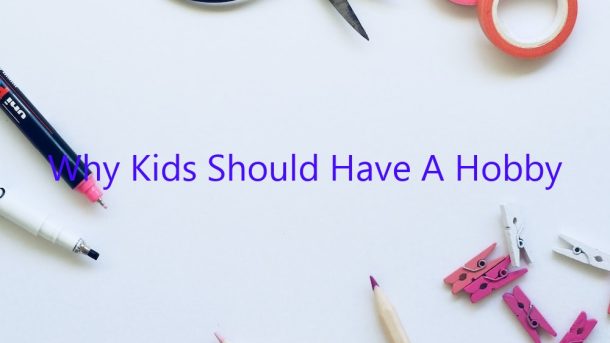Hobbies provide kids with a creative outlet and can help them develop new skills. They can also foster a sense of independence and help kids learn how to manage their own time.
Contents
Do children need hobbies?
There’s no question that hobbies are important for adults, but do children need hobbies, too? The answer is a resounding “yes”!
Hobbies provide children with opportunities to learn new things, be creative, and explore their interests. They can also help children develop important life skills, such as discipline, patience, and perseverance.
Here are just a few of the many benefits that children can reap from enjoying hobbies:
-Hobbies can help children learn new things. Whether a child is interested in painting, playing the violin, or collecting stamps, there’s no shortage of hobbies that can introduce them to new things. By engaging in a hobby, children can explore different subjects and learn new skills.
-Hobbies can help children be creative. Many hobbies allow children to be creative, such as painting, sculpting, writing, and sewing. When children are allowed to be creative, they can express themselves in ways that might not be possible in other areas of their lives.
-Hobbies can help children develop interests and passions. When children are young, they might not know what they want to do when they grow up. However, through their hobbies, they can explore a variety of interests and develop passions that they might want to pursue later in life.
-Hobbies can help children learn life skills. In order to be successful at a hobby, children often need to develop important life skills, such as discipline, patience, and perseverance. These skills can help children in many areas of their lives, both now and in the future.
Why is having a hobby so important?
Everyone needs a hobby. It’s a way to relax and escape the stress of everyday life. It can also be a way to learn new things and meet new people.
Hobbies can provide a sense of accomplishment and can boost your self-esteem. They can also help you stay physically active and mentally healthy.
Hobbies can be a great way to relieve boredom and can help you stay creative. They can also help you learn new skills and can keep your brain active.
If you’re looking for a new hobby, there are plenty of options to choose from. You can take up a new sport, learn a new skill, or join a club or group that interests you.
Whatever hobby you choose, be sure to set aside time for it each week. And most importantly, have fun!
What hobbies should kids have?
What hobbies should kids have?
There are many different hobbies that kids can have. Some popular hobbies include playing sports, painting, drawing, and playing music.
Playing sports is a great hobby for kids because it helps them stay fit and teaches them teamwork skills. Painting and drawing are also great hobbies for kids because they help them develop their creativity and artistic skills. Playing music is also a great hobby for kids because it helps them learn about music and develop their musical abilities.
Other hobbies that kids can have include reading, hiking, biking, and camping. Reading is a great hobby for kids because it helps them learn about different topics and develop their reading skills. Hiking, biking, and camping are all great hobbies for kids because they allow them to enjoy the outdoors and learn about nature.
So, what hobbies should kids have?
There are many different hobbies that kids can have, and each one has its own benefits. Some of the most popular hobbies for kids include playing sports, painting, drawing, and playing music. Other hobbies that kids can enjoy include reading, hiking, biking, and camping.
What age do kids develop hobbies?
There’s no one answer to the question of when kids develop hobbies. Some kids might start getting interested in hobbies around the age of 10 or 11, while others might not become interested in any hobbies until they’re in their late teens or early twenties.
There are a number of different things that can contribute to a child’s development of hobbies. One of the most important factors is simply the age at which the child is developmentally ready to start exploring new interests. Some kids are naturally more curious and adventurous than others, and they’ll be more likely to start exploring new hobbies at an earlier age.
Another important factor is the child’s environment. If the child lives in a household where there are lots of different kinds of hobbies being pursued, they’re more likely to develop their own interests in that area. Conversely, if the child’s family is more traditional and doesn’t engage in many hobbies, they’re likely to be more interested in activities that are new and different to them.
Many kids also develop hobbies as a way of expressing themselves. They might find that they’re particularly good at painting or music, for example, and start to focus on those activities as a way of expressing their thoughts and feelings.
Ultimately, there’s no one answer to the question of when kids develop hobbies. It varies from child to child, and is influenced by a variety of different factors.
Do you think parents should encourage their children to have a hobby or interest?
There are many different opinions on this topic. Some parents believe that their children should focus on their studies and not have a hobby or interest. Other parents believe that it is important for their children to have a hobby or interest, in order to help them develop various skills and talents.
There are many benefits to having a hobby or interest. A hobby or interest can help children learn new skills and explore their creative side. It can also help them build new relationships and learn new things about different cultures.
Some parents believe that it is important for their children to have a hobby or interest that is related to their career goals. For example, if a child wants to become a doctor, it might be a good idea for them to participate in activities that involve science and medicine. However, other parents believe that it is more important for their children to have a hobby or interest that is unrelated to their career goals. This can help children develop a wider range of skills and talents.
Ultimately, it is up to the parents to decide whether or not they should encourage their children to have a hobby or interest. Some parents may find that their children are already interested in a particular hobby or activity, and they can simply provide encouragement and support. Other parents may need to help their children find a hobby or interest that they are passionate about.
How having hobbies can change one’s life?
Having hobbies can change your life by giving you something to focus on other than work or school. Hobbies can provide a creative outlet, help you meet new people, and keep you active.
One of the best things about hobbies is that they can be whatever you want them to be. If you’re not into sports, you can join a book club or a crafting group. If you love being outdoors, you can go hiking or camping. There are endless possibilities when it comes to hobbies, and you can find one that suits your interests and personality.
Hobbies can also provide a sense of community. If you enjoy baking, for example, you can join a baking group or attend baking classes. These groups provide a social outlet and allow you to meet new people who share your interests.
Hobbies can also help you stay active. If you love to dance, for example, you can take dance classes. If you like to hike, you can go on hikes with friends. Physical activity is important for overall health, and hobbies can help you get moving.
If you’re looking for a way to change up your routine, try picking up a new hobby. Hobbies can provide new challenges and new opportunities to learn. They can also help you meet new people and stay active. So, what are you waiting for? Pick up a new hobby today!
Is it OK to not have hobbies?
There is no right or wrong answer to the question of whether it is OK to not have hobbies. Some people feel a great sense of purpose and fulfillment from pursuing hobbies, while others do not. Ultimately, the decision whether or not to have hobbies is a personal one.
There are a number of benefits to having hobbies. Pursuing hobbies can help people learn new skills, meet new people, and explore new interests. Hobbies can also help people relax and relieve stress.
However, there are also some potential downsides to having hobbies. Pursuing hobbies can be expensive, and it can be difficult to find time to pursue hobbies when people are already busy with work and family obligations.
Ultimately, the decision whether or not to have hobbies is a personal one. Some people find great satisfaction in pursuing hobbies, while others do not. There is no right or wrong answer, and everyone should do what makes them happy.




